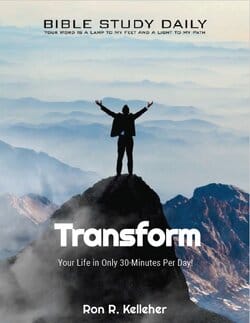What I Noticed Today (Leviticus 22-23)
Leviticus 22
Leviticus 22 is focused on laws for priests regarding their food and acceptable sacrifices. Three cases are described: priests must be ceremonially clean, only certain people are allowed to eat holy offerings, and offering to the Lord must be unblemished.
Note: The chapter opens and closes with, “You shall not profane my Holy name.”
In verses 1-16, the Lord gives Moses instructions for Aaron and Aaron’s sons regarding the proper handling of holy offerings. God is Holy, and all that comes near Him must be clean.
- First, the priests themselves must be clean when they serve before the Lord. No ceremonially unclean priest is allowed to come near to God or eat the holy offerings.
- Second, priests are not allowed to take that which is Holy and share it with outsiders. Food sacrificed to God was Holy and acceptable for the priests and their immediate families to eat, but no one else. If anyone eats a holy offering by mistake, they must add a fifth to its value and give it to the priest.
In verses 17-33, the Lord gives Moses instructions for Aaron and his sons, and all the people of Israel regarding acceptable sacrifices
- Third, the offerings to the Lord, whether they be animals, grain, or oil must be the best, without blemish. Neither an Israelite or a foreigner living among them was to present any animal that was blemished to the Lord as an offering.
- A baby born to an ox, sheep, or goat must be allowed to stay with its mother for seven days but can be sacrificed on the eighth day.
- An animal is not to be sacrificed on the same day as its young.
- A thank offering must be eaten on the same day, do not let any remain until morning.
Note: In Exodus 20:2, just as God is about to give the people the Ten Commandments, He reminds the people that He is their God, the one who brought them out of Egypt. The same reminder is seen here in chapter 22:32-33 as the laws for administering service to God are brought to a close.
Leviticus 23
Chapter 23 establishes the calendar of feasts for the nation of Israel.
In verses 1-3, the Lord gives Moses instructions for the nation of Israel regarding the feast calendar and reminds the Israelites about laws regarding the Sabbath.
In verses 4-44, The Lord appoints the times of the festivals for the Israelites:
- Passover. Celebrated the first month at twilight on the fourteenth day.
- Festival of Unleavened Bread. Celebrated the fifteenth day of the first month. For seven days they are to eat unleavened bread.
- Feast of Firstfruits. Celebrated during the Festival of Unleavened Bread. A thank offering is commemorating the barley harvest to the Lord.
- Festival of Harvest/Weeks (Pentecost). Celebrated seven weeks after Passover. It commemorates the giving of the law at Mount Sinai.
- Feast of Firstfruits. Celebrated during the Festival of Harvest. A thank offering is commemorating the wheat harvest to the Lord.
- Festival of Trumpets (Rosh Hashanah). Celebrated on the first day of the seventh month to commemorate the beginning of the civil new year.
- Day of Atonement (Yom Kippur), celebrated the tenth day of the seventh month. A day of fasting in which the high priest makes atonement for the people of Israel.
- Feast of Tabernacles/Booths (Sukkot). Celebrated for seven days from the 15th through the 21st of the seventh month. It was a celebration of God’s provision.
Note: The number seven is prominent in the feast calendar. There are seven feasts (six major feasts plus the two Firstfruits). The seventh day was the Sabbath. Three feasts occurred in the seventh month. The Sabbatical year was the seventh year, and the Golden Jubilee was celebrated in the 49th year (7 times 7).
Note: The Passover celebration and the Feast of Unleavened Bread remind the nation that they were delivered from Egypt by His hand. The Feast of Tabernacles is a reminder that the people lived in tents (booths) during the period of their desert wanderings.
Note: The Feast of First Fruits, Pentecost, and Tabernacles were tied to the agricultural roots of the people and a reminder that they should rejoice in all that He had provided.
Note: Finally, the Day of Atonement was a day for the entire nation to repent of the sins and come to God for cleansing.
Some thoughts for additional consideration:
- We would do well today to remember that God is our strength and our protector. We should rejoice in all that He has provided. And we most certainly should come before Him in prayer confessing our sins and asking for His forgiveness.
What did you notice in your study today? Feel free to visit the website and leave a question or a comment.

